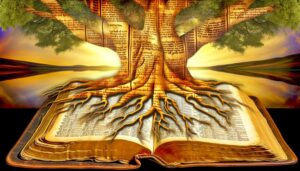Let the Dead Bury the Dead Bible Verse Meaning: Explanation
In Matthew 8:22, Jesus’ statement, ‘Let the dead bury their own dead,’ underscores the urgent and total commitment required for discipleship. This directive reflects the necessity of prioritizing spiritual obligations over traditional familial duties, especially within the socio-political and religious complexities of ancient Judea.
By challenging conventional Jewish burial customs and broader societal expectations, Jesus calls His followers to a radical reorientation towards the Kingdom of God. This message, while provocative, emphasizes undivided allegiance to Christ, urging devotees to reconsider their priorities and embrace a transformative faith journey.
Continue exploring to grasp the depth of this vital teaching.
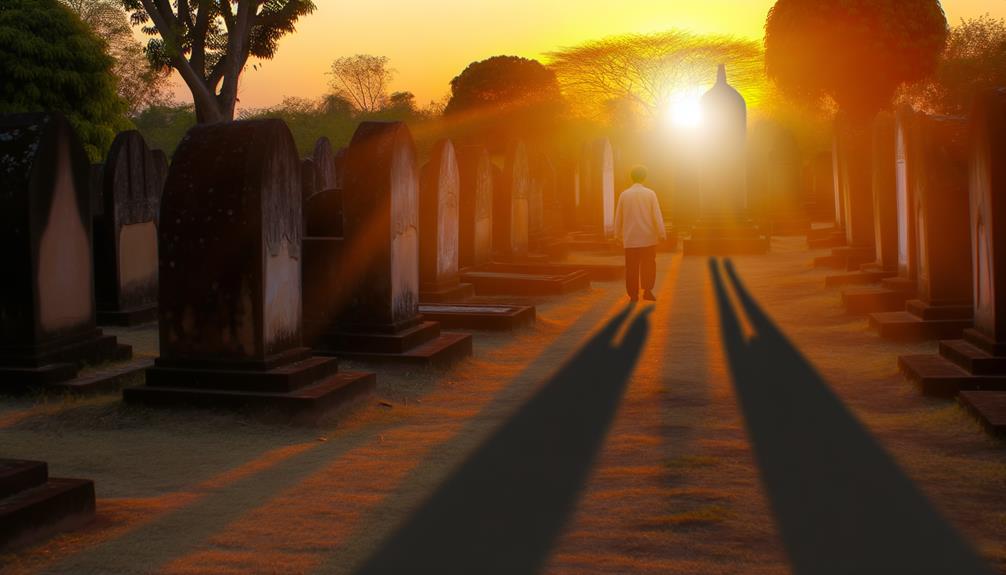
Let the Dead Bury the Dead Bible Verse Meaning: Understanding Luke 9:60
| Aspect | Explanation |
|---|---|
| Verse Reference | Luke 9:60: Jesus responds to a disciple who wanted to first bury his father before following Him. |
| Literal Phrase | “Let the dead bury their own dead” implies prioritizing spiritual obligations over earthly ones. |
| Biblical Context | Jesus challenges a follower to focus on proclaiming God’s kingdom above all personal or cultural traditions. |
| Metaphorical Meaning | The spiritually “dead” (those not following Christ) can handle worldly matters; the spiritually alive must serve God’s mission. |
| Spiritual Insight | Highlights the urgency and importance of following Jesus without delay or distraction. |
| Life Application | Encourages believers to prioritize their relationship with God and the work of His kingdom above all else. |
| Key Lesson | Commitment to Christ requires radical dedication, even at the cost of forsaking societal or familial norms. |
Biblical Context
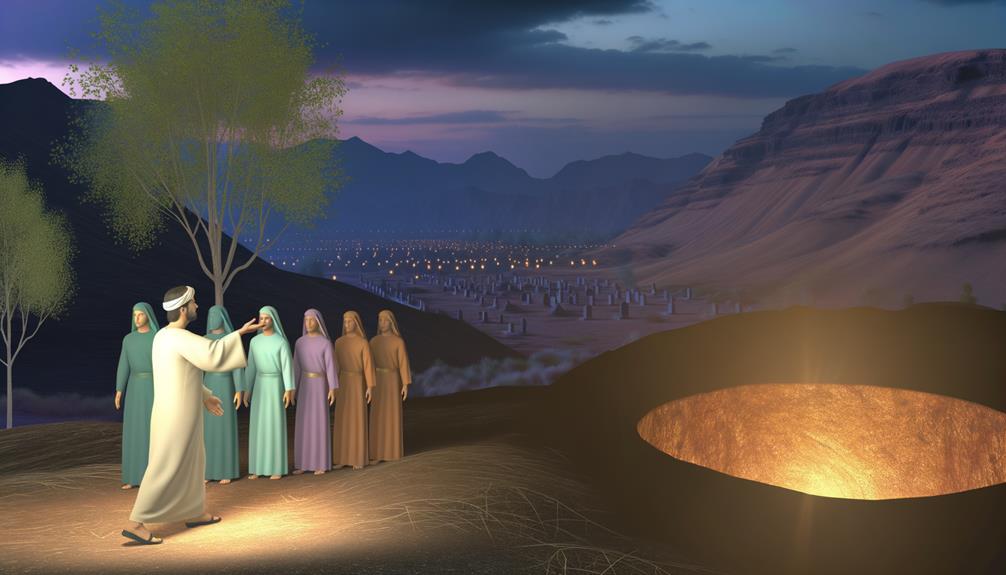
In understanding the phrase ‘Let the dead bury the dead,’ it is essential to examine its occurrence within the Gospel of Matthew, specifically in Matthew 8:22, where Jesus responds to a disciple’s request to first bury his father.
This verse is pivotal in understanding the radical demands of discipleship. Jesus’ response underscores a call to prioritize spiritual obligations over traditional familial duties.
Theologically, it highlights the urgency of following Christ and the necessity of undivided allegiance to His teachings.
Scripturally, this moment demonstrates the transformative nature of Jesus’ call, urging believers to transcend societal norms for a higher divine purpose.
This passage challenges followers to evaluate their commitments in light of the eternal kingdom’s imperatives.
Historical Background
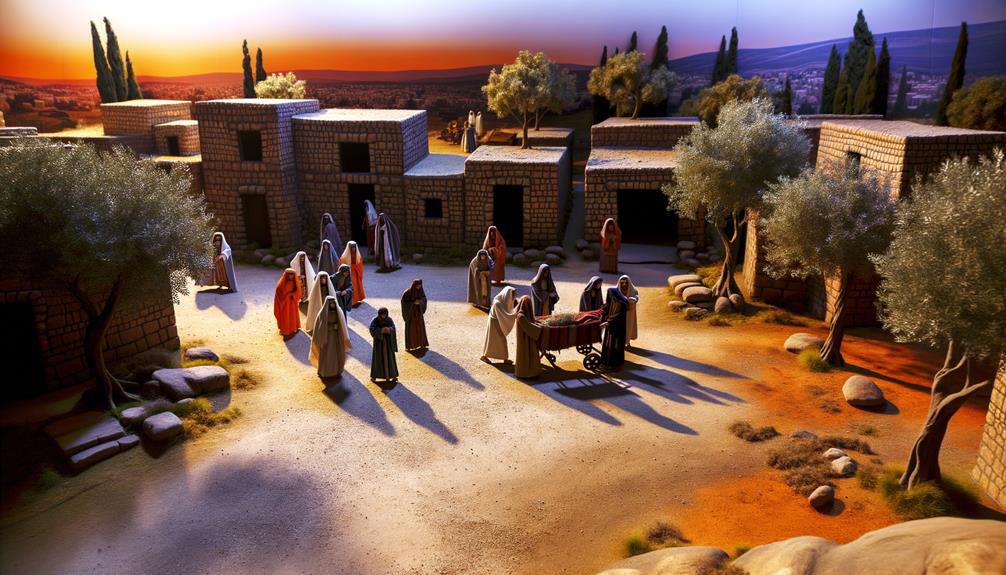
To understand the phrase ‘Let the dead bury the dead,’ it is essential to contemplate the context of ancient Judea and the prevailing Jewish burial traditions. These customs, deeply rooted in the religious and cultural milieu, often required significant familial obligations.
Additionally, Jesus’ statement must be viewed through the lens of the radical demands of discipleship, where following Him often meant prioritizing His call over conventional social and familial duties.
Context of Ancient Judea
Ancient Judea’s socio-political landscape during the time of Jesus was marked by Roman occupation, Jewish religious traditions, and cultural expectations that profoundly influenced daily life and religious practices.
The Roman Empire exerted control through local governors and the Herodian dynasty, creating a complex web of political tension. Concurrently, Jewish religious leaders upheld Mosaic Law, which dictated various aspects of life, including Sabbath observance, dietary restrictions, and rituals.
This environment fostered a blend of religious devotion and socio-political resistance. Jesus’ teachings often challenged the status quo, pushing against both Roman oppression and rigid interpretations of the Law.
Understanding this context is crucial for interpreting his statements, including the provocative command to ‘Let the dead bury their own dead.’
Jewish Burial Traditions
Amidst the socio-political and religious complexities of ancient Judea, Jewish burial traditions held significant importance, reflecting deep-seated beliefs about life, death, and the afterlife.
Rooted in scriptural mandates and evolving through historical circumstances, burial practices were a profound expression of piety and community.
The Torah and Talmud provided detailed guidelines—prompt burial within 24 hours, meticulous washing (taharah), and shrouding (tachrichim) of the deceased.
These customs symbolized purity and respect for the body, seen as created in the image of God (imago Dei).
The act of burial itself, often in family tombs, underscored a connection to ancestral heritage and divine covenant.
Collectively, these practices fostered a continuity of faith and communal solidarity in the face of mortality.
Jesus’ Discipleship Challenges
The call to discipleship in Jesus’ ministry presented profound challenges that were deeply intertwined with the socio-religious landscape of 1st-century Judea. At that time, Jewish society was governed by strict religious laws and social norms, including obligations to family and community.
Jesus’ directive to ‘let the dead bury their own dead’ (Matthew 8:22) signified a radical departure from these societal expectations. This statement underscored the urgency and total commitment required to follow Him, even at the expense of traditional familial duties.
The historical context reveals a period of intense religious fervor and Roman occupation, making Jesus’ call for immediate and unwavering discipleship a profound act of spiritual and social defiance.
Theological Interpretation

In the theological interpretation of ‘Let the dead bury the dead,’ Christ emphasizes the primacy of spiritual commitments over societal and familial obligations.
This directive calls for a life that transcends traditional customs, urging believers to prioritize their discipleship and the pursuit of the Kingdom of God above earthly concerns.
Spiritual Priorities First
Understanding the phrase ‘Let the dead bury their own dead’ demands an exploration into the theological implications of prioritizing spiritual commitments over earthly obligations. This statement by Jesus in Matthew 8:22 underscores the supremacy of following Him above all societal and familial duties.
Theologically, it calls believers to:
- Prioritize the Kingdom of God: Embrace discipleship despite personal sacrifices.
- Trust in Divine Providence: Entrust worldly concerns to God’s care.
- Embrace Eternal Perspective: Focus on spiritual growth and eternal life.
Historically, this directive challenged Jewish customs where honoring the dead was paramount.
Scripturally, it echoes the call to radical discipleship, urging followers to place unwavering faith in Christ above all else, thereby reshaping their entire life’s focus.
Life Beyond Tradition
Rooted in the call to prioritize spiritual commitments, ‘Life Beyond Tradition‘ invites believers to transcend cultural norms and rituals, embracing a faith that redefines their existence through the teachings of Christ.
Historically, Jesus challenged prevailing customs by emphasizing the immediacy of God’s kingdom over societal expectations.
Theologically, this call underscores the transient nature of earthly traditions when juxtaposed with the eternal significance of discipleship.
Matthew 8:22, where Jesus states, ‘Follow me, and let the dead bury their own dead,’ serves as a poignant reminder to prioritize divine mandates over familial and societal obligations.
Scripturally, it advocates for a transformative journey, urging followers to reorient their lives around the imperatives of the Gospel, thereby fostering a deeper, more authentic spiritual experience.
Discipleship and Commitment
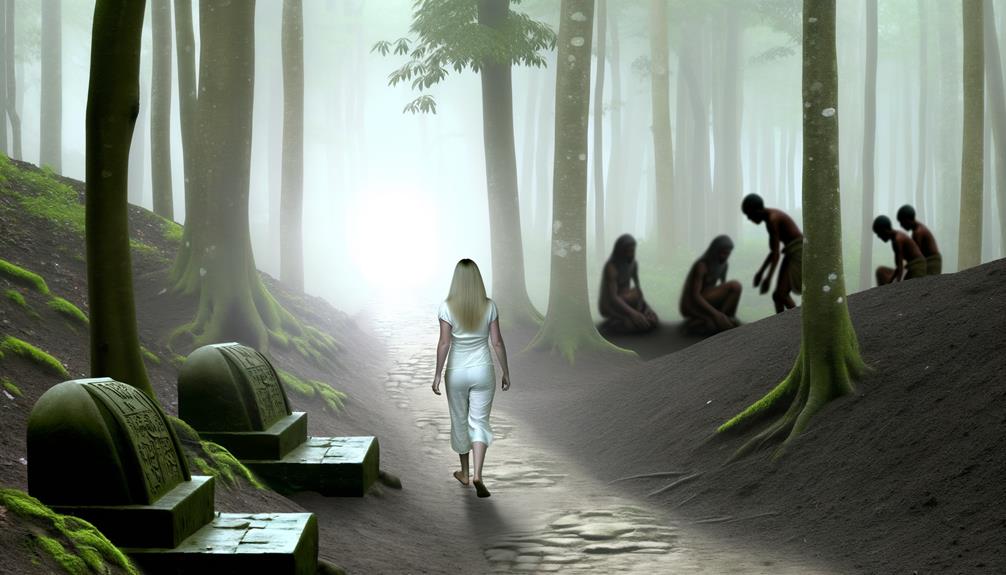
Embracing the call to discipleship demands an unwavering commitment that often requires placing one’s spiritual obligations above societal and familial expectations.
This profound dedication is vividly illustrated in the biblical narrative where Jesus instructs a potential follower to ‘let the dead bury their own dead’ (Luke 9:60).
Historically, this phrase underscores the radical nature of Jesus’ ministry and the immediate, all-encompassing loyalty He sought from His disciples.
Theologically, it serves as a powerful reminder of the cost of discipleship, urging believers to:
- Prioritize the Kingdom of God over earthly ties.
- Embrace sacrificial living in pursuit of spiritual growth.
- Commit fully and unreservedly to the path of Christ.
Such demands challenge conventional norms and call for profound reflection and action.
Spiritual Priorities

In the pursuit of spiritual priorities, believers are called to discern and elevate the eternal over the temporal, aligning their lives with the imperatives of the Kingdom of God.
This directive, encapsulated in Jesus’ words, ‘Let the dead bury their own dead’ (Matthew 8:22; Luke 9:60), underscores the urgency of the Gospel mission. It highlights the necessity of prioritizing spiritual matters over earthly concerns and the call to follow Christ without hesitation. Understanding this, one might also find value in related teachings, such as the ‘time to kill verse explained,’ which illustrates the broader context of life and death in God’s plan, emphasizing that there are decisive moments in our lives where our choices reflect our commitment to faith.
Historically, such a mandate challenged prevailing Jewish customs that prioritized burial rites as acts of piety.
Theologically, it signifies a paradigm shift, urging followers to prioritize the transcendent call of discipleship over traditional familial obligations.
Scripturally, it beckons a reorientation towards divine purpose, emphasizing that spiritual allegiance to Christ should supersede societal norms and personal attachments, thereby fostering an unwavering commitment to God’s eternal kingdom.
Modern-Day Relevance

Understanding the modern-day relevance of Jesus’ directive to ‘let the dead bury their own dead’ requires an examination of how this call to prioritize discipleship over traditional obligations resonates within contemporary Christian life. This principle challenges believers to evaluate their commitments and align them with spiritual priorities.
The directive remains profoundly impactful, urging Christians to:
- Prioritize Faith Over Cultural Norms: In a world preoccupied with societal expectations, Jesus’ words beckon believers to place spiritual growth above all else.
- Embrace Radical Discipleship: True discipleship may demand leaving behind even the most sacred social duties.
- Cultivate a Life of Eternal Significance: By focusing on eternal values over temporal concerns, Christians are called to live meaningfully and purposefully.
These aspects underscore the timeless call to wholehearted devotion.
Conclusion
In sum, the directive ‘let the dead bury the dead’ serves as a profound theological mandate, urging unwavering discipleship and prioritization of spiritual commitments over earthly obligations.
This biblical exhortation, steeped in historical and cultural nuance, challenges believers to transcend temporal concerns for eternal truths.
Ultimately, it underscores the paramount importance of spiritual priorities, resonating with modern readers as a call to elevate divine allegiance above all else, echoing through the corridors of time.





